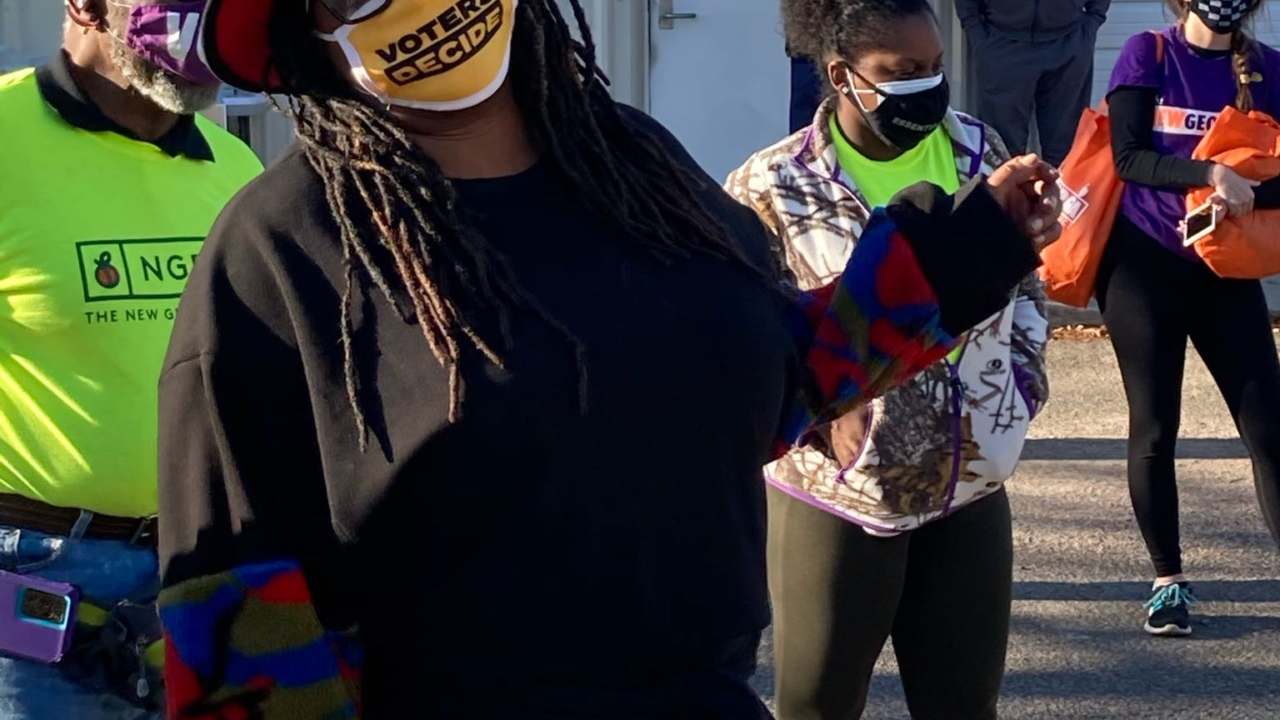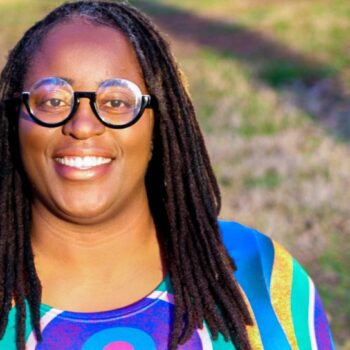When I asked Nsé Ufot how she sustained her vision for organizing Georgia, she responded: “I care about Black people. I care about people of color. I care about community.” Ufot knows that the issues facing working-class Black and brown communities across the state — like its $5.15 minimum wage — can only be solved by electing new leaders. Since 2014, the New Georgia Project (NGP), the voter registration organization that Ufot runs, has registered nearly 500,000 voters and brought roughly 60,000 new voters to the polls. NGP’s efforts, along with those of other grassroots organizations in the state, played a critical role in flipping Georgia blue. Ufot sat down with The Forge to talk about NGP’s strategies for reaching new voters, the group’s investment in statewide organizing, and the work ahead to beat back voter suppression and register every eligible Black and brown voter in the state. This interview has been edited and condensed.
-Lindsay Zafir
Georgia had historically high turnout in the last election cycle. What do you think organizers and organizations did to make the difference in turnout? And what can we take into future campaigns?
In my community, they say that if you stay ready, you don’t have to get ready. And that is how we contributed to the electoral results this year. We stayed ready and when these electoral opportunities presented themselves repeatedly this year, we were able to take advantage of them as a part of winning on our larger agenda.
One of the central goals of our electoral work is — “every voter, every election.” We want to try to grow super voters. These are folks who vote in every election for which they are eligible. Senior citizens tend to be super voters. Black women tend to be super voters. What is it that your granny and your grandpa know? What is it that Black women know that encourages them to vote in every election despite the fact that they’re getting tons of competing messages about whether their vote matters? At the core of this work is a bold, aggressive research agenda. We are constantly testing messages. We are constantly testing our tactics to see what is likely to move people to act.
Black voters are key to winning elections as a part of Georgia’s multiracial, multiethnic majority. And so, we’re having conversations about how much [these voters] matter, connecting the dots between the things they care about, and having regular conversations about what is at the top of mind. What are their hopes and fears? What would they like to see if you were queen for a day? We knocked on two million doors, made seven million phone calls, sent over four million text messages. We are a trusted actor, a credible actor with infrastructure that’s allowed us to continue to leverage our relationships. And when the rubber met the road, when it was time for us to flex our power, [we made clear] that voting in this election was the least they could do in our efforts to build a better Georgia and fight for all these issues we’ve been talking about for some time.
There’s a narrative circulating that the victory in Georgia was due to demographic shifts in Atlanta and its suburbs. What’s your take on this narrative, and what opportunities do you think there are for progressive rural organizing in Georgia and in the South?
There is no statewide victory in Georgia without deep engagement of Georgia’s rural progressive majority, which includes tons of African Americans and Latinos. Our approach is similar in rural parts of the state. We are going directly to young people, we are going directly to Black folk, and engaging them around the issues that matter to them. [We are] doing work to build ourselves as trusted partners so that we can fight in the court of public opinion with our communications efforts. Sometimes, we are fighting in actual court because of the attacks on our elections infrastructure. It’s organizing, it’s boots on the ground, it’s showing up, it’s building a volunteer network.
We always hear that young people don’t vote. What is your approach for youth voter registration and turnout?
It’s not young people being unreliable; it’s a lack of familiarity with the system. Where do you go to learn about voting and campaigns and elections? That’s not part of our public education. We are doing what we can to make civics education a part of popular education and making sure it’s not corny.
We had bold, ambitious goals for voter registration in 2020. We were going to hit as many county fairs as possible. All the music festivals. All the dorm move-in and move-out days, all of that. And none of that was available to us because of COVID. So, [we brainstormed]: What were the things about those events that made everybody super pumped? It was an opportunity to participate in a necessary joyous activity with members of the community, talk about issues that mattered, and make the case for why voting is one of the ways they can work on those issues. How do we take that and export it to events that people are doing online?
So we launched Twitch the Vote on Twitch, an online streaming platform that gamers use. We brought in a bunch of e-sports players and young people who watch people play video games. They talk about the game itself but also healthcare, the pandemic. On National Voter Registration Day, we registered 9,000 people in one day. We gave away fifty pairs of the year’s hottest sneakers. We brought in Black and brown professional video game players to talk about their journey, the culture of gaming, and why they are voting. We did it again on Election Day in November, had half a million unique viewers on our Election Day live stream.
Our goals never shifted, but the tactics did.
I don’t think that anything is as powerful or will have contributed more to Gen Zs becoming super voters like flipping Georgia with 0.25% of the vote. We’re talking about an 11,000 vote difference that survived three recounts. Any Georgian that says, “But my vote doesn’t count” — there are thousands of young people who voted for the first time who can tell them that that’s not the case. I’m very excited about the future.
Read the issue: Debriefing the Resistance


